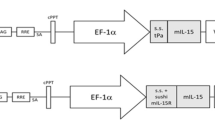Abstract
Polyethylene glycol (PEG-8000)-modified recombinant human interleukin-2 (PEG-rIL-2) is a cytokine with prolonged circulatory half-life. In this paper, the antitumor effects of PEG-rIL-2 against mouse uterine cervical carcinoma (U14) transplanted intraperitoneally or subcutaneously is reported. PEG-rIL-2 at different doses was administered intraperitoneally. The results showed that PEG-rIL-2 (4500 IU, i.p., QD×5) prolonged survival time of mice bearing ascites tumor as compared to rIL-2 (P<0.01), but PEG-rIL-2 at lower doses was without therapeutic effect In addition, compared to rIL-2, PEG-rIL-2 at different doses (1500–13500 IU, s.c, QD×5) caused significant dose-dependent growth inhibition of solid tumor (P<0.01) when the treatment started at day 4 after subcutaneous inoculation of tumor.
Similar content being viewed by others
References
1979;6:279.
1992; 8:384.
Morgan DA, Ruscetti FW, Gallo RG. Selectivein vitro growth of T-lymphocytes from normal human bone marrows. Science 1976; 193:1007.
Rosenberg SA, Spess PJ, Lafreniere R. A new approach to the adoptive immunotherapy of cancer with tumor infiltrating lymphocytes. Science 1986; 233:1318.
Rosenberg SA, Lotze MT, Muul LN, et al. A progress report on the treatment of 157 patients with advanced cancer using lymphokine activated killer cells and interleukin-2 or high-dose interleukin-2 alone. N Engl J Med 1987; 316:889.
Katre NV, Knauf MJ, Laird WJ. Chemical modification of recombinant interleukin-2 by polyethylene glycol increases its potency in the murine Meth A sarcoma model. Proc Natl Acad Sci USA 1987; 84:1487.
Zimmerman RJ, Aukermen SL, Katre NV, et al. Schedule dependency of the antitumor activity and toxicity of polyethylene glycol-modified interleukin-2 in murine tumor model. Cancer Res 1989; 49:6521.
Mattijssen V, Balemans LTM, Steerenberg PA, et al. Polyethylene glycol-modified interleukin-2 is superior to interleukin-2 in locoreginal immunotherapy of established guinea-pig tumors. Int J Cancer 1992; 51:812.
Balemans LTM, Mattijssen V, Steerenberg PA, et al. Locoreginal therapy with polyethylene glycol-modified interleukin-2 of an intraderminally growing hepatocellular carcinoma in the guinea-pig induces t-cell-mediated antitumor activity. Cancer Immuno J Immunother 1993; 37:7.
Author information
Authors and Affiliations
Rights and permissions
About this article
Cite this article
Wang, L., Wu, Y., Zhang, Y. et al. Antitumor effects of polyethylene glycol-modified recombinant human interleukin-2 on mouse uterine cervical carcinomain vivo . Chin J Cancer Res 9, 28–31 (1997). https://doi.org/10.1007/BF02974717
Accepted:
Issue Date:
DOI: https://doi.org/10.1007/BF02974717




